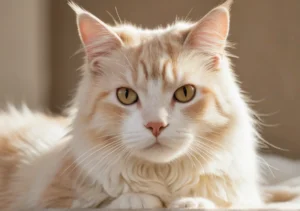Cats are known for their independent nature, often retreating to solitude during the day. Have you ever wondered why your feline friend prefers to isolate themselves? Let’s explore the reasons behind this behavior and gain a better understanding of our furry companions.
Many factors contribute to why cats isolate during the day, but one primary reason is their instinctual need for rest and relaxation. Cats are crepuscular creatures, meaning they are most active during dawn and dusk. This natural behavior aligns with their predatory instincts, as these are the times when their prey is most active. As a result, cats tend to conserve their energy during the day in preparation for their peak hunting hours.
Cats’ Sensory Sensitivity
Cats have incredibly heightened senses, making them more sensitive to environmental stimuli than we might realize. Their keen hearing and sharp eyesight can easily become overwhelmed by noise and movement throughout the day. This can lead cats to seek out quiet, isolated spaces where they can control their surroundings and find peace and comfort.
In these isolated spots, cats can minimize sensory overload, allowing them to relax and recharge without constant stimulation. So, if your feline friend seems to disappear during the busier parts of the day, it’s likely because they’re seeking a peaceful retreat to unwind and destress from the outside world.
Additionally, cats have a natural instinct to hide signs of weakness or vulnerability, so isolating themselves can also be a way for them to protect themselves from potential threats or predators lurking nearby. By finding a secluded spot to rest, cats can maintain a sense of security and safety, away from prying eyes or potential dangers.
Territory and Security
Another reason why cats isolate themselves during the day ties back to their innate need to establish and protect their territory. Cats are territorial creatures, marking their space with their scent through rubbing against objects or spraying urine. By retreating to a quiet and secluded area, cats can assert their ownership over that space and create a sense of security for themselves.
Moreover, isolation allows cats to monitor their territory from a safe distance, keeping a watchful eye over their domain without being directly in the line of fire. This behavior stems from their wild ancestors, who needed to stay alert and vigilant to survive in the wild.
In essence, when your cat retreats to a quiet corner or under the bed during the day, they are simply following their natural instincts to establish their territory, ensure their security, and find a peaceful sanctuary away from the noise and chaos of the outside world.
Remember, providing your cat with a cozy, secluded spot in your home where they can feel safe and secure is essential for their overall well-being and happiness. And if you notice them isolating themselves during the day, it’s perfectly normal behavior rooted in their instinctual need for peace, security, and quiet.
Social Hierarchy and Solitude
Cats are fascinating creatures with a strong sense of independence. In the wild, they are solitary hunters, and this instinct still lingers in our domesticated feline friends. Social hierarchy plays a crucial role in understanding why cats isolate during the day. Unlike pack animals like dogs, cats do not rely on constant social interaction for survival. They are selective about their companions and often prefer to have their own space. By isolating themselves, cats can establish their territory and assert their dominance within the home. This need for solitude is ingrained in their nature and is not a sign of unhappiness or distress.
Environmental Stimuli and Overstimulation
Cats have highly sensitive senses, making them susceptible to overstimulation in their environment. Loud noises, bright lights, or excessive human interaction can overwhelm them, leading to stress and anxiety. When faced with these stimuli, cats often retreat to secluded areas to destress and recharge. Providing your furry friend with a quiet, cozy spot where they can feel safe and secure is essential in preventing overstimulation. This retreat allows them to decompress and regain their composure, ensuring a happy and relaxed feline companion.
Unique Insight:
- Variety in Environments: Cats may seek isolation not just to escape overstimulation but also to explore and adapt to different environments. Offering a diverse range of spaces and hideaways within your home can cater to their curious nature and need for mental stimulation. By creating a stimulating yet peaceful environment, you can support your cat’s well-being and allow them to thrive in their solitary moments.
The Importance of Mental Stimulation
Cats are natural hunters, and even though they might not be prowling the savannah, their instincts remain strong. Providing them with mental stimulation during the day is crucial for their overall well-being. Isolating themselves allows cats to engage in activities that mimic their hunting instincts, like stalking, pouncing, and exploring their surroundings. Interactive toys that dispense treats or mimic prey can keep them engaged and mentally sharp.
For a unique insight, consider creating a “treasure hunt” for your cat by hiding treats around the house for them to discover. This not only provides mental stimulation but also taps into their natural curiosity and hunting instincts.
Behavioral Issues and Health Concerns
Prolonged isolation during the day can lead to behavioral issues and health concerns for cats. They are social animals, and being left alone for extended periods can result in anxiety, stress, and even depression. Monitoring their well-being is essential to catch any signs of distress early on. Providing enrichment activities, such as puzzle feeders or rotating toys, can help prevent boredom and the development of behavioral issues.
Grooming irregularities and changes in appetite can be early signs of stress or health issues in cats. If you notice any changes in their behavior, it’s crucial to consult with a veterinarian to address any underlying concerns promptly.
Remember, just like us, cats need mental stimulation and social interaction to thrive. Ensuring they have a stimulating environment during the day can lead to happier and healthier feline companions.
Creating a Cat-Friendly Environment
Is your feline friend spending a lot of time in isolation during the day? Don’t worry, it’s perfectly normal for cats to seek out alone time. However, as a responsible pet owner, you can create a cat-friendly environment that caters to their need for solitude while ensuring they stay happy and healthy. Here are some tips to help you out:
- Provide Vertical Space: Cats love to climb and perch up high. Install cat trees or shelving units to give your furry friend a safe space to relax and observe their surroundings.
- Offer Cozy Hideouts: Set up cozy hideouts like cat beds, igloos, or even cardboard boxes in quiet areas of your home. Cats enjoy having a secluded spot to retreat to when they need some alone time.
- Interactive Toys: Keep your cat entertained with interactive toys like puzzle feeders or laser pointers. This will help prevent boredom and encourage mental stimulation during their solo hours.
- Respect Their Boundaries: If your cat seeks out isolation, respect their boundaries. Avoid disturbing them when they are in their chosen spot, as this can cause stress and anxiety.
Creating a cat-friendly environment tailored to your feline friend’s needs will ensure they have a happy and healthy space to retreat to when they need some alone time. Remember, a little solitude can be purr-fectly normal for your cat!
For more in-depth tips on creating a cat-friendly environment, you can check out this helpful resource from the American Society for the Prevention of Cruelty to Animals (ASPCA): Creating a Healthy Environment for Your Cat.
Alex, a passionate animal lover, has experience in training and understanding animal behavior. As a proud pet parent to two dogs and three cats, he founded AnimalReport.net to share insights from animal experts and expand his knowledge of the animal kingdom.




